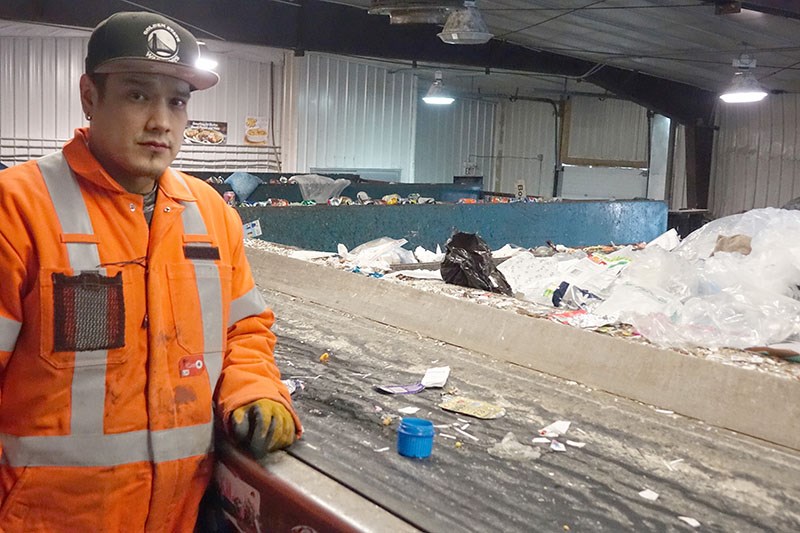The Thompson Recycle Centre is appealing to city residents to take care to ensure that they don’t put non-recyclable materials into their recycling bins.
This appeal is mainly directed at residential recyclers – “that’s where a lot of our contamination is”,” says Thompson Recycle Centre manager Billie-Jo Thompson. “There’s a lot of garbage in there.”
As much as a quarter of the material put into residential recycling bins, which is manually sorted by Thompson Recycle Centre employees, ends up going into a dumpster and from there to the landfill, Thompson says – as much as 500 kilograms per day. That represents a waste of staff time, money, resources and fuel, all dedicated to removing contaminants that should have gone into the garbage instead.
“It should have just been picked up and taken right to the landfill,” Thompson says.
Garbage getting tossed into recycling bins can also be a hazard for Thompson Recycle Centre staff, who have to deal with the smells of rotting material coming down the sorting line, especially during the summer months.
Aaron Carriere, 34, has worked at the recycle centre for about five months, sorting residential recycling as it passes by on a conveyor belt, then baling the material for transportation after it’s been sorted. Human and animal waste are among the health hazards he has to contend with daily.
“Pampers are number one the worst,” Carriere says. “I’d say kitty litter would be second. As if people would think you can recycle kitty litter.”
Other materials that inexplicably find their way into recycle bins include electronics, aerosol cans, oil containers and leftover food.
Milk jugs with leftover milk in them are among the items that assault employees’ nostrils.
“You don’t want to open up one of those if they have milk in there,” said Carriere. “It’ll stink up he whole building.”
Fish carcasses are another nasty surprise.
“We don’t throw those in the garbage, take it straight out to the dumpster,” he says.
In addition to making the workers’ jobs more pleasant, keeping garbage out of residential recycling also improves efficiency.
“Just once in a while there’s no garbage,” Carriere says. “We’re faster when there’s no garbage. It’s way better when there’s no garbage.”
Thompson says that the appeal to keep the garbage and recycling centre isn’t aimed at “wishcyclers” – people who throw items that seem like they might be recyclable (Styrofoam containers, for example) into their bins. It’s directed more towards people who don’t seem to consider the consequences of throwing obviously non-recyclable materials into recycling bins.
“The contamination slows us down,” she said. “We spend so much time pulling other stuff on the line and dealing with it appropriately. Those are things that we shouldn’t have to deal with. It takes time away from processing.”
In addition to trying to educate residents about recycling dos and don’ts, the Thompson Recycle Centre is working to have random bin inspections done more frequently.
The City of Thompson announced Jan. 23 that it will begin inspecting recycling bins for non-recyclable material as outlined in its Consolidated Solid Waste Bylaw.




